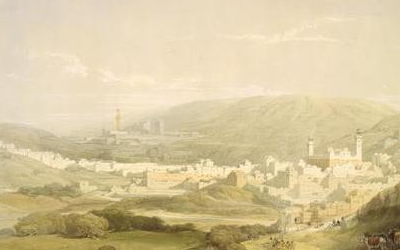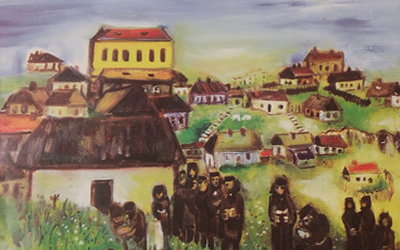The 1834 Hebron massacre occurred in early August 1834, when the forces of Ibrahim Pasha launched an assault against Hebron to crush the last pocket of significant resistance in Palestine during the Peasants' revolt in Palestine. After heavy street battles, the Egyptian Army defeated the rebels of Hebron, and afterward subjected Hebron's inhabitants to violence following the fall of the city. About 500 civilians and rebels were killed, while the Egyptian Army experienced 260 casualties.
Although the Jews had not participated in the uprising and despite Ibrahim Pasha's assurances that the Jewish quarter would be left unharmed, Hebronite Jews were attacked. A total of 12 Jews were killed. The Jews of Hebron later referred to the events as a Yagma el Gabireh ("great destruction").
After Ibrahim Pasha subdued Jabal Nablus, the epicenter of the revolt, they proceeded to pursue rebels led by the revolt's main leader, Qasim al-Ahmad, who had fled Jabal Nablus to Hebron, where he reached an agreement with the sheikhs of that town to continue the uprising. At a site in the northern vicinity of Hebron, the rebels encountered the Egyptian Army and entered into a brief engagement with them before withdrawing to Hebron. When the Egyptian Army entered the city, they fought the rebels, who were made up of peasants and townspeople, in heavy street battles. The rebels put up stiff resistance, but were ultimately dealt decisive blows by heavy Egyptian artillery. The rebels inflicted about 260 casualties on the Egyptian contingent at Hebron, which consisted of around 4,000 infantry and 2,000 cavalry, before the Egyptians gained full control over the city.
Mass killings by the Egyptian troops took place in Hebron after they captured the city from the rebels. About 500 rebels and inhabitants were killed. The Jews of Hebron had not participated in the rebellion, but Egyptian soldiers who entered the city ignored this. For three hours, troops committed atrocities against the people of Hebron. The Jews suffered the "most cruel outrages" and were targeted for "special violence". While many Muslims managed to escape the impending danger, the Jews remained, confident they would not be harmed by the Egyptians. Apparently, the Jews of Jerusalem had received an assurance from Ibrahim that Hebron's Jews would be protected. In the end, seven Jewish men and five girls were killed. Isaac Farhi also described violent attacks on the Jews of Hebron committed by Egyptian soldiers. He writes that the attack in Hebron was even worse than the plunder in Safed. Synagogues were desecrated, houses were ransacked, and valuable items were stolen leaving the Jewish community of Hebron destitute. The massacre succeeded in uniting Hebron's Sephardic and Ashkenasic communities, but it took until 1858 for the community to fully recover.
Sources:
https://en.wikipedia.org/wiki/Battle_of_Hebron








No Comments found